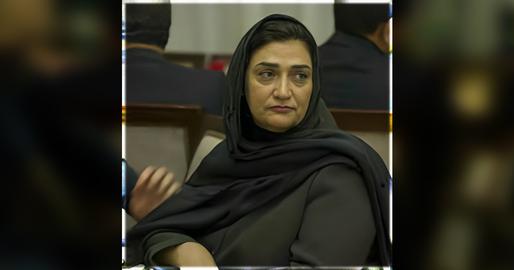In the aftermath of the Woman, Life, Freedom movement, several lawyers have faced arrest and received prison sentences for various reasons, though Marzieh Mohebi's verdict has taken an unexpected turn in the judicial system.
A court in the northeastern city of Mashhad issued a ruling for Mohebi – granting authorities the power to confiscate her properties – in violation of her citizenship rights.
With an impressive legal career spanning over three decades in Iranian courts, Mohebi has been a devoted advocate for women's rights. She is the esteemed founder and director of the non-profit organization, Sora Women Lawyers Association, which boasts a membership of approximately 250 lawyers.
In an interview with IranWire, Mohebi revealed that her organization has been tirelessly providing pro bono legal representation to incarcerated women in the Khorasan-Razavi province. Additionally, they have offered vital support to women who have endured violence and abuse.
Under her guidance, the association's lawyers have taken up cases involving child abuse, fought against child marriage, and advocated for women's rights, particularly in marginalized communities on the outskirts of Iranian cities.
Mohebi's situation escalated after the start of the Woman, Life, Freedom movement and the initiation of a legal case in Mashhad Revolutionary Court. Mounting pressures have now compelled her to leave the country in a bid to protect her safety.
Mohebi took to Twitter to announce the decree issued by the judicial system of the Islamic Republic, allowing the seizure of her property.
"The corrupt court in this land has stripped me of my rights and confiscated and destroyed my property," she said.
"Trust is a legal concept dating back to the time of caliphs and Islamic governments. It represents an agreement between the Islamic ruler and non-believers to live within the boundaries of the Islamic government, much like asylum," Mohebi said, explaining a part of her case during an interview with IranWire.
"If a non-believer violates the terms of this agreement, they lose the right to safety and their property is confiscated. In this way, the government could resort to punishment and property seizure," she said.
According to Mohebi, the Islamic Republic has extended this rule to its opponents and critics, allowing them to easily implement property confiscation orders.
In essence, the Revolutionary Court did not consider Mohebi's right to citizenship, which, according to Iranian laws, cannot be unilaterally abandoned by the government or its citizens.
Instead, they labeled her as a "refugee to the Islamic system" in her own country, which gave them the power to unilaterally revoke her right to shelter and to subsequently seize her property.
Regarding the charges in her case, Mohebi stated, "The judicial system of the Islamic Republic handles political charges in the revolutionary courts. Typically, security forces levy one or more accusations against political and civil activists and unjustly links them to Western spy organizations or the Mujahideen [MEK]. I have also faced a series of similar false accusations."
She further added, "The proceedings were completely illegal and disregarded fundamental legal principles and rules. My family members were arbitrarily summoned to court without any justification, and my property was confiscated under Article 49 of the Constitution, despite its irrelevance to my case."
Regarding the specifics of the accusations, Mohebi explained that the judicial system does not provide the indictment directly; instead, it allows only those referred to it to read it.
Accusations such as "connections with hostile organizations abroad," "leadership of protests," and "collaboration with the People's Mujahideen Organization [MEK]" have been brought against Mohebi.
She considers all these allegations utterly baseless, serving only as a pretext for further repression.
According to Mohebi, the verdict of confiscation of property is commonly imposed on those deemed "infidels" by the regime, but there is no such record for political defendants.
The verdict issued to lawyer Mohebi is unprecedented.
According to lawyer Moussa Barzin Khalifaloo, while such sentences have been historically imposed by the Iranian judiciary under various pretexts, such as Article 49 of the Constitution, this is the first time a lawyer's property has been targeted solely because of her profession.
Article 49 stipulates the confiscation of wealth obtained through illegal means like usury, bribery, theft, or embezzlement.
Previously, the properties of individuals associated with the Pahlavi government and Baha'is were seized based on this provision.
However, Khalifaloo argues that applying it to a lawyer, unrelated to any criminal activity, is unlawful and contrary to Sharia principles.
He also added that having different political or religious opinions should not warrant property confiscation.
Describing the government's long-standing pressure on lawyers, especially those engaged in human rights cases, Khalifaloo points out that "since the [1979 Islamic] Revolution, statements against lawyers by prominent leaders like Ruhollah Khomeini, Sadegh Khalkhali, and Mohammad Beheshti led to the closure of lawyers' associations and created obstacles for those involved in human rights work."
Similarly, Mohammad Olyaei-Fard, another jurist and lawyer, sees the government's motive for issuing such harsh sentences as an attempt to suppress dissenting voices.
He deems the rulings based on Article 49 as illegal since they lack proper legal procedures, as no law has been passed in the parliament to support such actions.
Olyaei-Fard notes that the independent nature of the lawyers' society gives them greater freedom to act, and despite the government's efforts to influence or undermine it, the legal community remains steadfast in defending the people's rights.
visit the accountability section
In this section of Iran Wire, you can contact the officials and launch your campaign for various problems



























comments